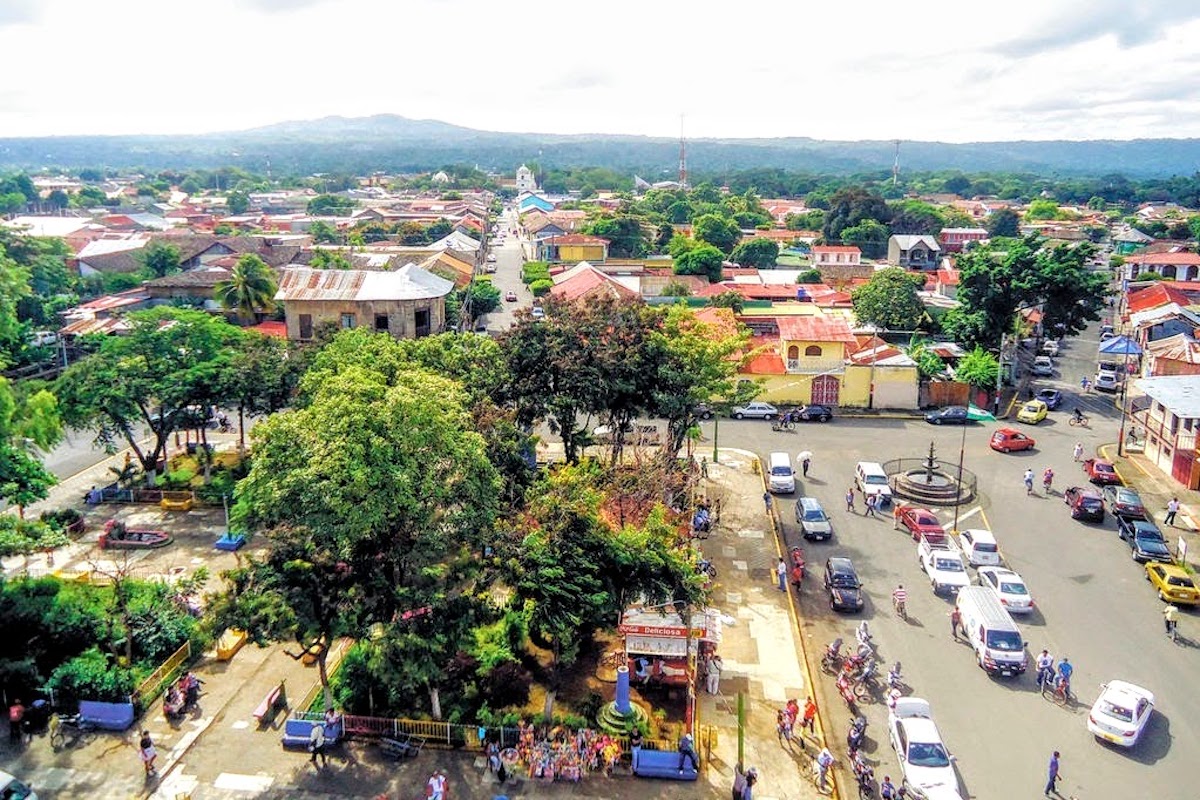
Butterfly Gardens and Machetes: A Volunteer Journey in Nicaragua
By: Sarah Stone
Skip to Section
Several years ago, I traveled to Masaya, Nicaragua to learn about a volunteer organization that invited travelers worldwide to assist with community-based programs.
My goal was to understand these volunteers’ roles and impact locally. The organization was founded by a couple of expats who’d lived in Nicaragua for several years; they set up volunteer partnerships around Masaya where travelers could help with social programs around the city and—more importantly—provide some funding for those initiatives.
A few projects that volunteers could sign up for included:
- Repairing computers and setting up new, donated laptops for students at various schools
- Helping in schools’ organic gardens, which grew fruits and vegetables for students’ lunches
- Teaching English to new learners
- Providing basic assistance in a medical clinic and shadowing medical staff
- Helping with childcare at local daycare centers
Depending on the program, volunteers could stay for a couple of weeks, or a minimum of one month, with no upper limit. Participants paid for their housing and meals and donated to individual volunteer projects. There was also a Spanish teacher onsite for those travelers who wanted to become more conversational in the language.
I only got to stay for a week, but in addition to meeting a dedicated team of people who wanted to do good for their community, there were a couple of fun little highlights!
Zoológico Nacional De Nicaragua (The National Zoo of Nicaragua)
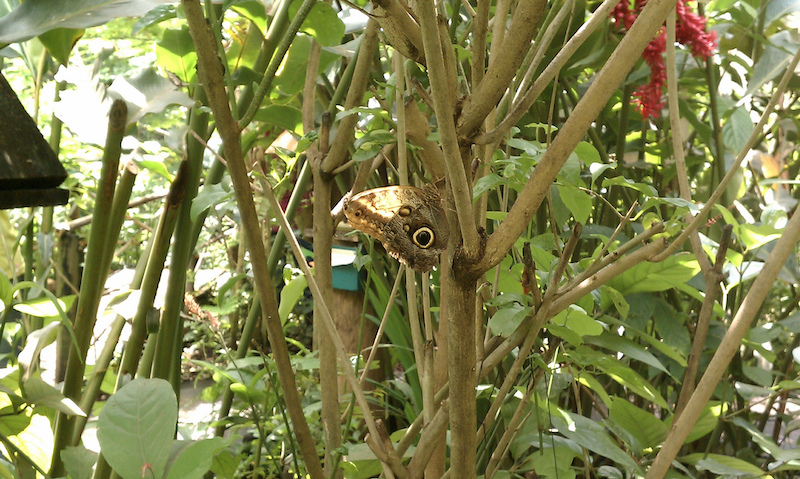
One of the many butterflies in the garden at the National Zoo
That week, the team was exploring a partnership with the Zoológico Nacional De Nicaragua, and, being a huge animal lover, I jumped at the chance to help out in the butterfly garden for a couple of days.
As we walked in, a macaw stationed at the entrance greeted everyone with a chipper “Buenas!”
There were many animals at the National Zoo, all with their own stories—some were injured and being nursed back to health so they could be released into the wild. Some were victims of the illegal wildlife trade and were confiscated. Others were abandoned by their owners and had nowhere to go.
I had two jobs for the next couple of days: to collect butterfly eggs from the garden, and to transfer caterpillars from mostly-eaten leaves to brand-new ones in the nursery.
The butterfly eggs were like tiny black pills grouped in bunches underneath large leaves throughout the garden. If I found eggs, I’d gently wipe them off the leaf and into a plastic cup, which I’d then bring to an indoor caterpillar nursery for safekeeping.
Within the nursery, there were hundreds of caterpillars munching away on their own plants until they were ready to build cocoons. If I saw that a caterpillar was close to finishing a leaf, I’d pick it up and move it to another one.
Outside of the butterfly garden and caterpillar nursery, I had the chance to see lots of other animals, including a tiger, an ocelot, crocodiles, an agouti, an anteater, a jaguar, monkeys, toucans, and many more.
Learning to Use a Machete
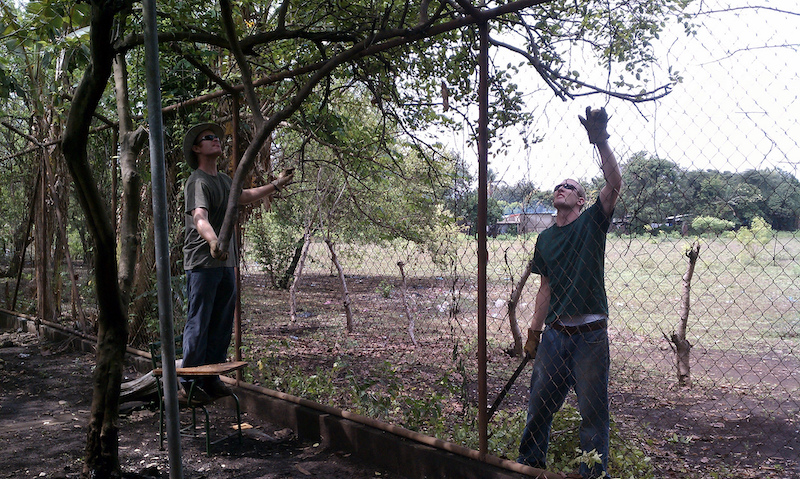
Cutting away smaller branches before getting to the big one
For one day of the trip, I headed out to a school with the volunteer team, where we cut down a large tree branch that was hanging dangerously over the roof of the school building. If it were to fall, it would cause severe damage to the structure—and could put the children in danger.
We took turns hacking away at the branch with a machete. It was tough work! As we made progress, we tied a rope around the branch and pulled it toward the playground, away from the building. The more that was hacked away, the stronger we pulled the branch, until a loud crack signaled it was giving way. A few more whacks with the machete, and we were able to get the branch safely onto the ground and hauled away.
A Tornado
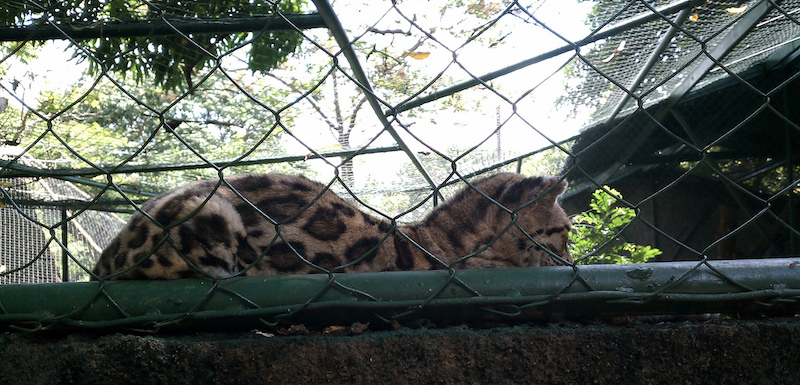
I don’t have photos from this part of the trip, so enjoy this little ocelot from the zoo!
On my last full day in Masaya, we took the bus into Managua to see Men in Black III. There was a storm coming in, but we didn’t worry too much about it—the wind kicked up quite a lot as we exited the bus and made our way through the overpass above the highway toward the theater.
About a half-hour into the movie, the power cut out but came back on within 30 seconds.
Then it cut out again; this time, we could hear wind buffeting the theater.
This happened several times, all for a moment or so, with the movie picking up wherever it left off last. The final power outage lasted about five minutes—we all stayed put eating candy, talking quietly, and listening to what sounded like an impressive storm outside.
Turns out a tornado touched down close by! It didn’t do much damage, thankfully, and I still have a soft spot for Men in Black III.
About the Author
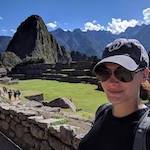 As the editor-in-chief of Frayed Passport, my goal is to help you build a lifestyle that lets you travel the world whenever you want and however long you want, and not worry about where your next paycheck will come from. I've been to 20+ countries and five continents, lived for years as a full-time digital nomad, and have worked completely remotely since 2015. If you would like to share your story with our community, or partner with Frayed Passport, get in touch with me using the form on our About page.
As the editor-in-chief of Frayed Passport, my goal is to help you build a lifestyle that lets you travel the world whenever you want and however long you want, and not worry about where your next paycheck will come from. I've been to 20+ countries and five continents, lived for years as a full-time digital nomad, and have worked completely remotely since 2015. If you would like to share your story with our community, or partner with Frayed Passport, get in touch with me using the form on our About page.Inline images courtesy of the author.
Featured image by AntoLa22 on Wikimedia Commons.
Information published on this website and across our networks can change over time. Stories and recommendations reflect the subjective opinions of our writers. You should consult multiple sources to ensure you have the most current, safe, and correct details for your own research and plans.
Frayed Passport is a participant in the Amazon Associates Program, an affiliate advertising program designed to provide a means for sites to earn advertising fees by advertising and linking to Amazon.com. We also may share links to other affiliates and sponsors in articles across our website.




